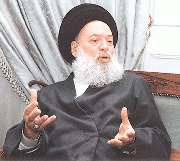In one of his Friday sermons in January, 75-year-old Grand Ayatollah Sayed Mohamed Hussein Fadlullah, who died Sunday in Beirut, spoke to his followers about “true Islam.” “The true Islam,” he said, “wants us to base our lives on reason and to elevate it by means of knowledge, so as to enrich it and be enriched by it.” This sentence summed up Fadlullah, or Al-Sayed as his followers called him, and the doctrine he embraced across a lifelong struggle for Islam. It was also this doctrine that earned Al-Sayed iconic status across the Muslim world for his great contribution to Islamic thought and jurisprudence, elevating him as one of the great Islamic thinkers of his time.

|
| Grand Ayatollah Sayed Mohamed Hussein Fadlullah |
Born in 1935 in the city of Najaf to Lebanese parents, Fadlullah grew up in a family of scholars. His father, Ayatollah Abdel-Raouf Fadlullah, migrated to Iraq to complete his religious education in Al-Hawza Al-Deeniya (the religious seminary). Fadlullah followed in his father’s footsteps and was the disciple of many celebrated Shi’a scholars, including Abul- Qassem Al-Khoei, Mohsen Al-Hakim and Mohamed Baqir Al-Sadr. Upon completing his religious education, Fadlullah displayed great talent in interpretation and inspired a growing following of students. In 1966, he went to Lebanon to establish the Institute of Islamic Jurisprudence.
Fadlullah’s Friday sermons were not just about religious teachings alone. What perhaps singled him out among his peers was that he never separated politics from religion. While the first parts of his sermons would tackle religious issues, Fadlullah was keen to address current affairs in subsequent parts. At the heart of his body of teaching, three key issues rose to dominance: the struggle for Palestine, fighting for Islamic unity, and resisting U.S. hegemony and Arab despotism. Hardly a sermon went by without reference to these topics and Fadlullah always displayed an impressive knowledge of current affairs. He reserved the harshest words for Arab officialdom, the U.S. and Israel. Indeed, his scathing criticism of U.S. policies in the region and Israel’s occupation of Arab land made him a target of numerous assassination attempts on his life. The most dangerous was during the 1980s when an explosion targeted his headquarters in Al-Imam Al-Reda Mosque in Bir Al-Abad area. Fingers pointed to both the U.S. and Saudi Arabia.
Over the years Fadlullah grew to become one of the most prominent scholars of Islamic thought and an inspiration for the nascent Islamic movement in Lebanon. When the Islamic Resistance Movement (Hizbullah) came into existence in 1982, Fadlullah became its spiritual leader. Along the years, the relationship grew complicated. The year 1994 represented a watershed. Fadlullah declared himself a marjie taqlid (a source of emulation) and addressed the issue of wilayat al-faqih (the guardianship of the clerics), which he did not accept. He maintained a distance from both Hizbullah and the Islamic Republic of Iran, presenting himself as an independent scholar and jurist. Despite being subject to smear campaigns from time to time, Fadlullah remained committed to the cause of resistance. Until his last days, Fadlullah defended both Iran and Hizbullah against campaigns that targeted them.
A notable number of Hizbullah followers continue to consider Fadlullah as their source of emulation. Hizbullah Secretary-General Hassan Nasrallah once described the relationship with Fadlullah by saying “both Hizbullah and Sayed Fadlullah have a unity of purpose and of vision.” Following Fadlullah’s death, Nasrallah issued a statement referring to himself and other resistance leaders as “among Fadlullah’s disciples.” The statement was viewed as a move to put an end to speculation surrounding the complicated relationship. After the 2006 Israeli war on Lebanon, Fadlullah was among the few voices that continued to lend support to the resistance, both in his sermons and interviews.
But perhaps Fadlullah’s greatest achievement, followers would argue, is the fact that he radically changed the ways in which religious scholars interact with their societies. He was a man of the people and he made frequent reference to his relationship with his followers. One reason he chose to be buried in Al-Emamyen Al-Hassanyein Mosque in Beirut’s southern district and not in Najaf, according to tradition, was, in his words, because “I want people to be able to reach me even after I am gone.” Identified as a great reformer, Fadlullah once explained that reform “does not mean to innovate Islam itself… rather innovation is in how to understand this revelation, the Holy Qur’an.”
Among the legacies Fadlullah is leaving behind is an extensive network of social institutions. This includes nine orphanages, 18 schools, and a large number of religious and cultural centers in Lebanon, Syria and Iraq.
From Al Ahram, July 8-14, 2010.






Leave a Reply